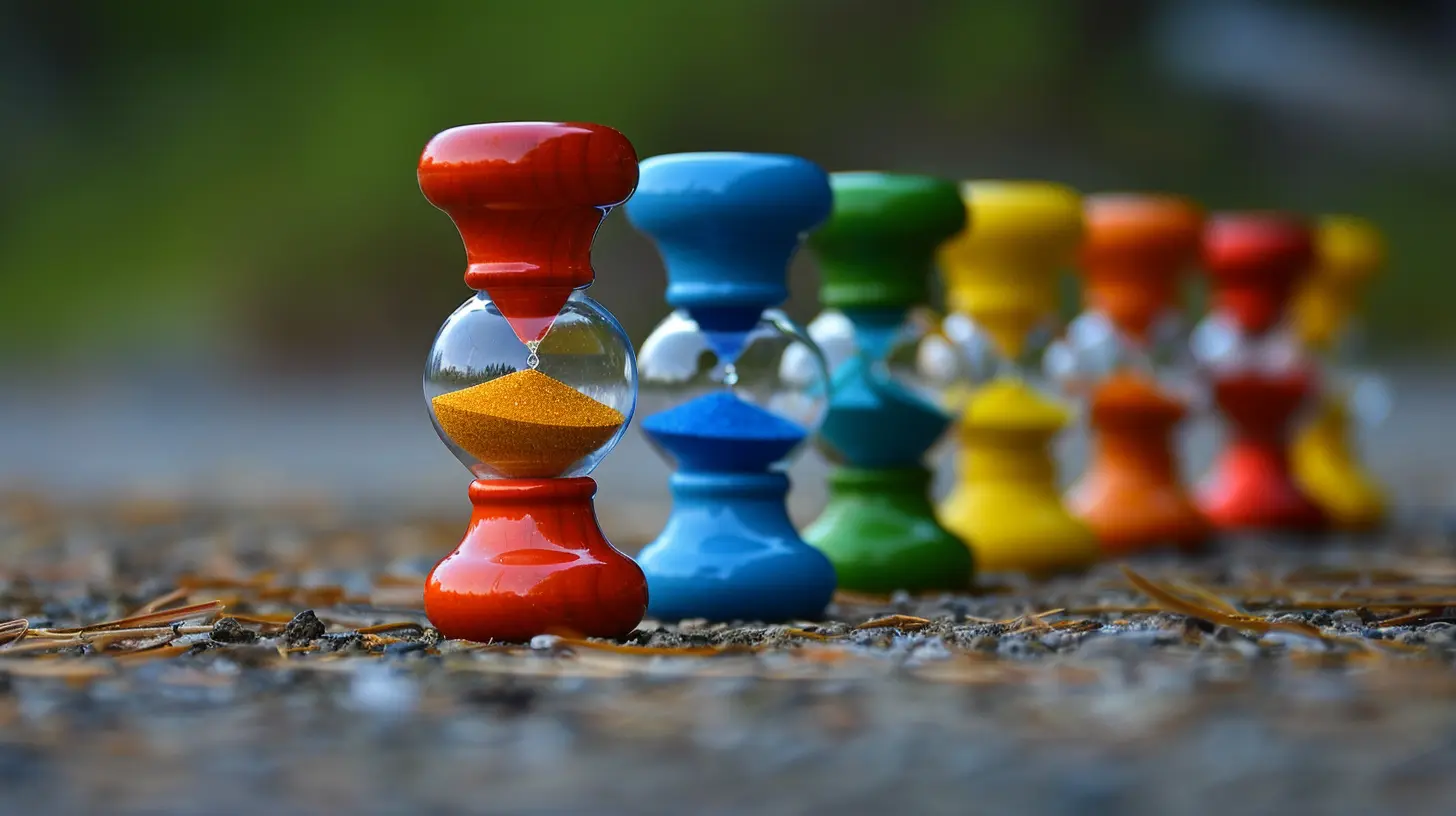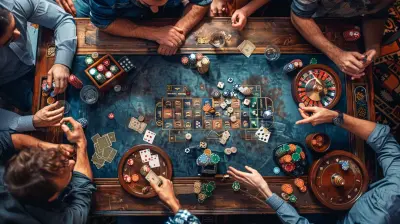Task Juggling: Advanced Strategies for Time Management Game Veterans
9 July 2025
If you’ve ever found yourself managing a café during a breakfast rush, prepping potions in an alchemy shop, or rushing to serve impatient guests at a hotel—all within the span of a few minutes—then you're no stranger to the wild world of time management games.
But let’s be real: once you’ve mastered the basics, those early levels start to feel like a leisurely stroll through a park. That’s when the real challenge begins. For seasoned veterans, where every click counts and multitasking is second nature, leveling up your strategy becomes crucial.
So, whether you’ve clocked in hundreds of hours on titles like Diner Dash, Cook, Serve, Delicious, Overcooked, or Time Management Simulator, this guide is for you. Let’s dive deep into advanced strategies and task juggling tactics that’ll keep you one step ahead—even when the chaos cranks up to eleven.
What Makes Time Management Games So Addictive?
Before we dig into tactics, let’s take a quick look at why we love these games so much.Time management games tickle that part of our brain that craves order amidst chaos. They’re fast-paced, satisfying, and often deceptively simple—until they’re not. One minute you’re breezing through levels; the next, you’re sweating bullets trying to refill soda, flip pancakes, and clean a table… all while the game’s timer laughs at your pain.
It's that blend of pressure and productivity that hooks us. And once you've been bitten by the bug, you want to get better—faster, smarter, more efficient.
The Art of Task Juggling: What It Really Means
Task juggling is more than just doing multiple things at once. It’s about knowing:- What to do
- When to do it
- How to do it efficiently
Imagine being a circus performer, but instead of juggling balls, you’re handling customer orders, restocking items, cleaning spills, and upgrading equipment. Drop one task? The whole performance suffers.
Veteran players know that success lies not in frantic clicking, but in intentional clicking.
Strategy #1: Master the Queue Mentality
One of the most effective tricks is getting in the habit of queuing up actions.Most time management games allow you to plan out several moves ahead. Take advantage of this! Don’t just click on a task, then wait for it to finish. Instead:
👣 Click a series of commands so your character moves smoothly from one action to the next, like a choreographed dance.
For example, in a cooking game:
1. Start frying bacon.
2. While it's cooking, grab toast.
3. Pour coffee.
4. Return to flip the bacon.
5. Deliver the full order.
This pre-planned sequence avoids downtime and keeps things flowing like clockwork.
Strategy #2: Prioritize with Purpose
Not all tasks are created equal.Some tasks are time-sensitive—like flipping a burger before it burns. Others can wait a beat—like wiping a table or restocking a sauce bottle.
To juggle effectively:
🔥 Handle "high-burn" tasks first.
🧊 Push "cold" (less urgent) tasks to fill idle gaps.
Here’s a rule of thumb: if something can go wrong by leaving it too long (like overcooking or unhappy customers walking out), deal with it NOW.
Everything else? Slot it in when the fire’s out.
Strategy #3: Embrace Path Optimization
Ever noticed how much time your character wastes walking back and forth?In high-level play, pathing becomes a secret weapon.
🧭 Think like a GPS: shortest route, least backtracking.
Before you perform a task, visualize the most efficient route. Can you deliver two meals in one trip? Can you restock the fridge on your way back from the trash bin?
Efficiency = fewer steps = more time = happier customers.
Strategy #4: Batch Tasks Like a Boss
Batching is grouping similar tasks together—and it’s game-changing.Let’s say you have three dirty tables and four waiting customers. Instead of cleaning one table every time someone complains, batch-clean all tables in one go. Then, seat all customers back-to-back.
This “assembly line” mindset reduces clicks, saves time, and clears bottlenecks.
Think of it like meal prepping in real life: do it all at once, and you’re golden.
Strategy #5: Upgrade Strategically, Not Impulsively
Veteran players know that upgrades win games—but only if chosen wisely.Don't just go for flashy decor or minor boosts. Focus on upgrades that:
- Reduce task time (e.g., faster cooking appliances)
- Improve capacity (e.g., more food slots or more seating)
- Automate a task completely (e.g., auto-refill stations)
Smart investments ease your workload and give you breathing room in later levels.
Pro tip: Always upgrade for function over fashion.
Strategy #6: Don’t Just Play—Analyze
After a tough level, do you just replay it and hope for the best?Here’s a better approach: treat each failure as data.
💡 Ask yourself:
- Where did I fall behind?
- Which task felt overwhelming?
- Was I waiting on a slow upgrade?
Veterans don’t just grind—they learn. Watch playbacks if available, or mentally retrace your steps. Find the friction points and smooth them out.
Like any sport, getting better means learning from your losses.
Strategy #7: Predict Patterns
Time management games aren’t random chaos. They often run on predictable patterns.Customers arrive in waves; certain tasks repeat; specific event triggers happen at set points.
The trick? Anticipate them.
If you know lunch rush hits around the 90-second mark, prep meals in advance. If customers always chain-order desserts, have them ready.
Being proactive instead of reactive separates good players from great ones.
Strategy #8: Train Your Muscle Memory
Yeah, we’re going full gamer mode here.Once your fingers know where everything is—without thinking—you’ll move like a time-managing ninja.
Spend enough time mastering a screen layout, and your reflexes will take over. Suddenly, you’re making ten decisions a second without breaking a sweat.
It’s not magic—it’s muscle memory.
Tip: Replay some early levels just to train your hands.
Strategy #9: Stay Zen Under Pressure
Let’s be honest—things can get intense.Alarms ringing, timers ticking, customers fuming… it’s enough to rattle anyone.
But if you panic, you’ll start making mistakes—clicking the wrong task, misplacing orders, or skipping steps.
Veterans learn to stay calm. Center yourself. Breathe.
When chaos hits, slow down your brain even if your clicks stay fast. Think of it like playing jazz: the groove matters more than the frenzy.
Strategy #10: Know When to Restart
Sometimes, it's better to hit that restart button than to struggle through a doomed round.If your early sequence is inefficient, or if you miss a key action in the first 20 seconds, the ripple effect can ruin your whole run.
Veterans make peace with restarting—instead of fighting uphill, they go back and nail the opening.
It’s not giving up. It’s preparing for victory.
Bonus Tip: Play With a Friend—Co-op Time Management Games
Some of the most intense task juggling happens in co-op games like Overcooked or Moving Out. These games crank up the pressure and the fun by splitting tasks between players.The key? Communication and role division.
Assign roles clearly:
- “You chop veggies, I’ll fry them.”
- “You handle the dishes, I’ll serve.”
Stick to your lane, trust your partner, and watch the magic happen.
Teamwork makes the time work.
The Veteran’s Mindset: It’s a Marathon, Not a Sprint
At the end of the day, time management games are a blend of puzzle-solving, planning, and performance.As a veteran, your edge doesn’t come from faster reflexes alone—it comes from strategy, foresight, and experience. You’ve seen the chaos. You’ve walked through the fire. Now? You own it.
So next time the orders pile up or the shift gets overwhelming, just smile.
You’re a task juggling master. And this is just another day at the (virtual) office.
all images in this post were generated using AI tools
Category:
Time Management GamesAuthor:

Whitman Adams
Discussion
rate this article
2 comments
Phaedron Simon
This article offers valuable insights into advanced time management strategies for seasoned gamers. I appreciated the emphasis on prioritization and adaptability, which resonate not just in games but in real life as well. It's a great read for anyone looking to sharpen their multitasking skills!
October 7, 2025 at 3:14 PM

Whitman Adams
Thank you for your positive feedback! I'm glad you found the insights on prioritization and adaptability helpful for both gaming and real life. Happy multitasking!
Maggie Martin
Mastering task juggling transcends mere time management; it’s a reflection of our ability to prioritize values and adapt under pressure. In games, as in life, the balance between urgency and importance shapes our ultimate success.
July 11, 2025 at 3:51 PM

Whitman Adams
Absolutely! Mastering task juggling is indeed a dynamic blend of prioritizing values and adapting to challenges, both in games and life. Balancing urgency with importance is key to achieving success. Thanks for your insight!


